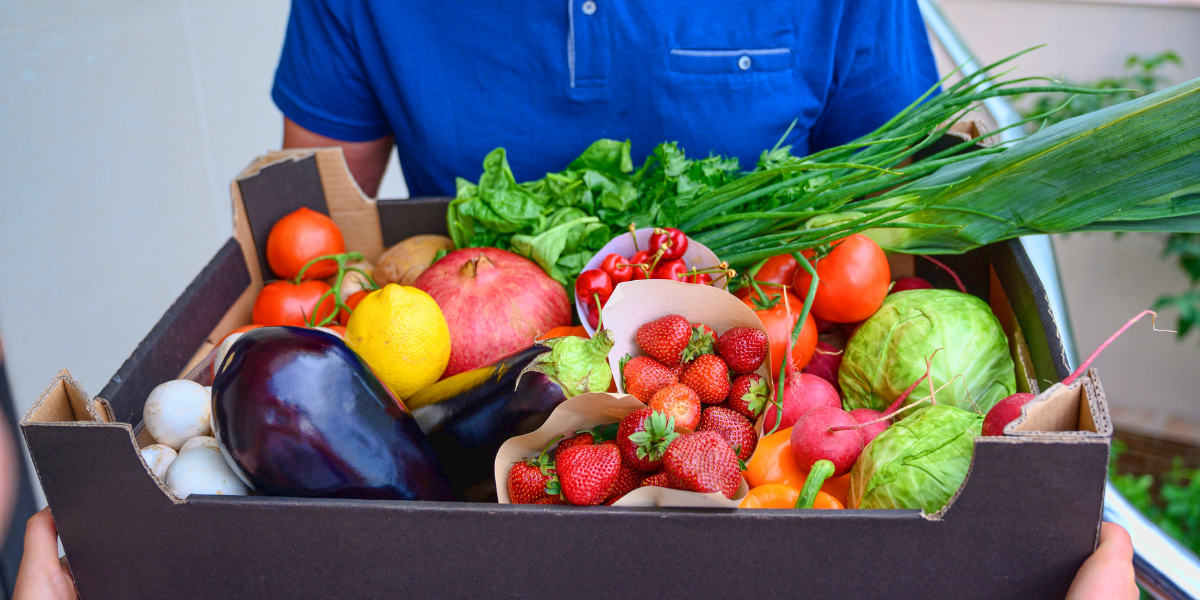How to Offer Home Delivery for Your Farm Business
COVID-19 has changed the business model for many farmers. As some markets close and traditional...

Your farm isn't just a plot of land; it's a legacy, a livelihood, and a labor of love. Whether you're a seasoned farmer or just starting out, finding the perfect name for your farm is a crucial step in establishing your identity and attracting customers.
One of our favorite questions to ask at Local Line is: what is the story behind your farm name? A great farm name is not only easy to remember but evokes a feeling, a story, or questions. It’s a conversation starter in many ways. But how do you come up with a name that captures your farm's essence while being memorable and appealing?
Don’t worry – we've compiled a comprehensive guide with 8 ways to develop a catchy farm name that will leave a lasting impression.
Pay homage to your family history or the stories about how your farm began. Consider using surnames, family names, or founding stories to add a personal touch to your farm's name.
“The farm has been in our family since 1917. My grandfather was born in the house, just two doors down. I moved back in here in 2015. My grandparents raised me. After my grandfather passed away, we wanted to find a name that honored him.
We just kept tossing stuff around and then it just hit us. He always used to paint all the tool handles red, so they were always easy to find if you lay them down in the field. We were like, that’s it! That makes us think of Papa. And so that's how the name came about: Red Handle Farm.” - Bridget McMillion
Use the name of your town, county, or region to incorporate the beauty of your surroundings. Highlight distinctive geographical features like rivers, mountains, or valleys to root your farm name in its natural habitat.
“Wolf Creek runs through our property, so it felt fitting. We always joke that we should have named the farm Coyote Creek because we constantly have coyotes running through the backside of the property trying to snatch up our chickens or our livestock.” - Karin Velez
Call our the main crops grown or animals raised. Use descriptive adjectives to showcase the quality or characteristics of your products.
“From my childhood home in New Mexico, the neighbors had some ducks that always came over. They decided they liked our house better than theirs. We hadn’t built our house yet, and we’re staying in a trailer. When we’d sit down to eat dinner, we would hear the ducks quacking outside our window. We looked at each other and said it sounds like they're telling some really good jokes, they're down there laughing. So I wanted to invoke that.” - Kathryn MacRoberts
Play around with puns or wordplay in your farm name.
Alliterations or rhymes are catchy and easy to remember!
“When I was in high school, and even now, I've always loved black. That's generally what I wear: all black. [My husband] wanted to get into farming. In the beginning, I was like, no thanks. This is your thing. I don't like animals. My mom used to grow up on a dairy farm, and we'd get milk from my grandparent's place and I hated the smell. I was like, I want nothing to do with farming.
I think that was his way of reeling me in a little bit, and letting him go ahead with the farm was like: Hey, we're gonna have a black barn mill. He's like, That's your favorite. Let's call it Black Barn Farms. And it just kind of rolls off your tongue.” - Sarah Lovenuk
Infuse your farm name with words that reflect your core values, whether it's sustainability, community, or tradition.
Lean into your farm mission or values by evoking emotions or aspirations into your farm name. Using words such as such as joy, abundance, or nurturing. These types of farm names make your customers feel a certain emotion.
You can take a completely different approach by using intriguing or mysterious words that make your farm name stand out. Words like enchanting or dreamy. Or calling out something other-worldly. Have fun with this one, and be sure to use a thesaurus!
Now that you're inspired with ideas, it's time to narrow down your options.
Reflect on your farm's identity:
Next, think about your target audience. Who are you trying to reach? Consider name ideas that would resonate with them.
Now’s the time to start brainstorming. Ideas can come from anywhere: chatting with family and friends, reading a book, or walking around the farm. Get the juices flowing with mind mapping. Start with your farm in the middle, and then jot down any ideas, words, and memories associated with it. If you’re feeling stuck, leverage online tools or name generators for inspiration!
The best name out of the bunch. First, check for potential name conflicts or trademarks before pursuing a name further. Next, assess the name's memorability and ease of pronunciation. Will people remember your name? Is it easy to search for? You also want to consider the name's scalability and potential for growth. Will it still encompass your operations 5 to 10 years from now? For example, right now, you sell predominantly beef, but you have plans to expand to other proteins in a few years. Will the name work for that business? Last, run the name by a few people. Get feedback from family, friends, or potential customers. See how the name resonates with them.
After you’ve verified the uniqueness of your farm name, you want to register your new name as a business entity or trademark. Secure your new domain name and relevant social media handles.
Now, your farm name is ready to launch. Start by building out your new brand: logo, colors, fonts, and brand messaging to match your new name. If you need help building out a brand, Local Line offers a logo and brand services for farms. Let us create a custom logo and brand guide that captures the magic of your farm!
After your brand assets are ready to go, it’s time to market!
Choosing the right farm name is just the beginning of your sales and marketing journey. A strong brand identity better equips you to attract customers and drive sales, especially in digital marketing.
If you’re looking for the right sales tool to start launching your new farm brand online, check out Local Line. Local Line is the number one sales software for farms selling direct and wholesale. With Local Line's farm e-commerce features and customizable branding options, your farm is ready for success.
Including the type of farm in the name can be important for clarity and branding. It helps customers understand what your farm specializes in and can attract the right audience i.e. calling out that you sell beef or produce. However, it's not always necessary, especially if your farm name has other distinctive elements.
Yes, you can change your farm name later on, but it may involve rebranding efforts and can confuse your customers. It's generally best to choose a name you're happy with from the start to avoid unnecessary complications.
Focus on creativity, relevance, and memorability to ensure your farm name stands out. Your farm name should represent you! Incorporate unique elements such as wordplay, alliteration, or references to your farm's story, values, or location. Conduct research to ensure your chosen name isn't already in use or very popular and that it resonates with your target audience.
Registering your farm name provides legal protection and establishes your exclusive rights to use it in your area of operation. Trademarking offers additional protection, especially if you plan to expand your business nationally or internationally. Consult with legal experts to determine the best course of action.
Nina Galle is the co-author of Ready Farmer One. She continues to arm farmers with the tools, knowledge, and community they need to sell online at Local Line.

Stay in the loop by subscribing to our newsletter and receive weekly insights that you won't want to miss.

COVID-19 has changed the business model for many farmers. As some markets close and traditional...
 Nina Galle
Nina Galle

Table of Contents Should I Use Social Media for my Farm? Benefits of Social Media for Farms? ...
 Paige Jones
Paige Jones

We're digging into a fundamental aspect of your farm's success—branding. Why is it essential, and...
 Nina Galle
Nina Galle